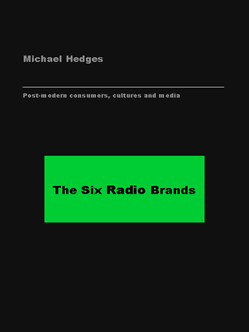ftm Radio Page - week ending September 21, 2018
Government cleavers public broadcaster for political aims
commercial music to fill the radio
The operating agreement between the Danish Culture Ministry and public broadcaster Danmarks Radio (DR) was published this week, scaling back the broadcasters radio and TV operations. Earlier this year the government and right-wing populist Dansk Folkeparti (Danish People’s Party) shaved €114 million (DKK 773 million) per year from the DR budget by 2020. Between 375 and 400 jobs will be cut. A further - and larger - round of downsizing will take place in 2021. General director Maria Rorbye Ronn said the concert hall built in 2010 might be sold off.
P6 Beat, P7 Mix and P8 Jazz, digital-only channels launched in 2011, will be closed. DR was an early adopter of digital radio broadcasting, launching about two dozen channels between 2002 and 2007. Most of those have either closed or migrated to the internet. All DR radio channels are distributed on DAB+ networks, which replaced the older DAB platform by 2015. Much of the programming from the alternative radio channels will migrate to podcasts and online platforms. Culture Minister Mette Bock explained that DRs mission must be a cultural institution providing services the commercial market cannot deliver. (See more about media in Denmark here)
The Danish music industry was jolted, saying diversity will be compromised. "I think this is one of the worst cases that has happened to the diverse musical scene in Denmark," said Danish Composers and Writers Association (DJBFA) president Susi Hyldgaard, quoted by Berlingske (September 19). “When you close P6 Beat, P7 Mix and P8 Jazz you remove the only showcase for this type of music.” Jazz Denmark president Eva Frost said “commercial music will come to fill too much of the radio.” Both noted that, aside from the loss of airtime, knowledgable show hosts will also be gone.
In a rebuke to the government action the European Broadcasting Union (EBU) called the cuts “political attempts to drastically narrow and alter the accepted broad remit of public service media,” in a statement (September 20). (See EBU statement here) “There is compelling evidence that market forces alone do not deliver consumers an offer of media services that contribute to the sense of belonging to a nation, region or continent. Rather than being forced back into the second row, the EBU's Executive Board believes that this is the moment for public service media to be firmly positioned in the front row and empowered to fully play their role - in the interests of audiences, performers, writers, producers, innovators and the long-term strength and democratic health of our European continent.”
Change Is Exciting, Consequences Unnerving
 Most media operators know that a key to success is staying a half-step ahead of the audience. Being a whole-step ahead, figuratively, risks confusion. People will seek familiarity. Following by a whole-step is worse. People will get bored and race to a more interesting alternative. Knowing where, exactly, that half-step is at any given moment is no mean feat.
Most media operators know that a key to success is staying a half-step ahead of the audience. Being a whole-step ahead, figuratively, risks confusion. People will seek familiarity. Following by a whole-step is worse. People will get bored and race to a more interesting alternative. Knowing where, exactly, that half-step is at any given moment is no mean feat.
- See also...
Radio Page week ending September 14, 2018
radio in Lithuania, music quotas, M-1
Radio Page week ending September 7, 2018
radio in the UK, BBC, BBC Radio 2, Chris Evans, Virgin Radio, DJs, show hosts, digital radio, radio in Austria, RadioTest, GfK, audience measurement, ORF
Radio Page week ending August 10, 2018
radio in the UK, radio audience, RAJAR, BBC Radio, public broadcasting, commercial radio, Radio 2, Radio 4, LBC, Heart, Classic FM, digital radio, digital transition
Radio Page week ending July 27, 2018
radio in Paris, Il de France region, FIP, Radio Orient, Tropiques FM, radio in Denmark, DR Medieforskning, summer listening, young people, podcasts, radio in France, Médiamétrie, radio audience, RTL, Radio France, France Inter, France Info, Lagardere Active, Europe 1, RMC, NRJ, RFM, Nostalgie, Skyrock
Radio Page week ending July 20, 2018
radio in France, Mediametrie, audience measurement, electronic measurement, radio in Germany, radio audience, MA 2018 Audio II, digital radio, DAB+, online radio
Radio Page week ending July 13, 2018
radio in Switzerland, Mediapulse, audience measurement
Radio Page week ending July 6, 2018
radio in Germany, public radio, Deutschlandfunk, children's radio, Kakadu, radio in Belgium, radio audience, audience measurement, CIM, RTBF, VRT, Qmusic, Studio Brussel, Radio Contact, VivaCite
Radio Page week ending June 29, 2018
radio in Bulgaria, media ownership, Fresh Media Bulgaria, BG Radio, Radio 1, Radio Nova, Radio Veronika, City Radio, Communicorp
Radio Page week ending June 22, 2018
radio advertising, Cannes Lions Radio and Audio, radio in the UK, BBC Radio, measurement, streaming media, radio in Hungary, Class FM, Retro Radio, Retro FM, Radio 1, Slager FM
Radio Page week ending June 15, 2018
radio in Denmark, FM shut-off, DAB+, digital transition
Radio Page week ending June 8, 2018
radio in Finland, Sputnik Radio, Spirit FM, Basso Media, radio license
Recently added radio audience figures and resources
- UK - National Radio Audience (August 2018)
market share, trend, sectors - UK - London Radio Audience (August 2018)
market share, trend - UK - National Radio Audience (August 2018)
BBC/commercial 'gap' - France - Greater Paris Radio Audience (July 2018)
national and local channels, market share, trend - France - National Radio Audience (July 2018)
national channels, sectors, market share, reach/TSL - Netherlands - Radio Audience (May 2018)
national survey, market share, trend - Switzerland - Radio listening by region (Jaunary 2018)
public and private sectors, penetration, time spent listening - Switzerland - French region Radio Audience (January 2018)
share, trend - Switzerland - Swiss-German region Radio Audience (January 2018)
share, trend - Switzerland - Italian region Radio Audience (January 2018)
share, trend - Spain - National Radio Audience (released November 2017)
national channels, reach share, trend - Poland - National Radio Audience (November 2017)
national survey, market share, trend - Czech Republic - Radio Audience (November 2017)
Top stations, national survey, reach trend - Turkey - Major Media - Radio Broadcasting (October 2017)
ownership, management, program formats, platforms, audience estimates - France - National Radio Summer Audience (September 2017)
national channels, summer period 2012-2017 trend - Belgium - Flemish region, Radio Audience (June 2017)
market share, trend - Belgium - French region, Radio Audience (June 2017)
market share, trend - Portugal - National Radio Audience (May 2017)
leading stations, audience share, trend - Germany - Radio Audience (March 2017)
leading stations, audience trend, daily reach - Romania - Radio Audience (January 2017)
national and Bucharest surveys, market share, trend - Italy - Major Media - Radio Broadcasting (July 2016)
public and private broadcasting companies, channels, audience reach/share, management - Spain - National Radio Audience (April 2016)
national channels, reach share, trend - Sweden - Major Media - Radio Broadcasting (February 2016)
public and private radio channels, owners, management, national market share trend - Poland - Major Media - Radio Broadcasting (January 2016)
public and private radio channels, owners, management, platforms, market share - Estonia - Major Media - Radio Broadcasting (December 2015)
public and private broadcasting companies, channels, management, platforms, audience estimates - Spain - Major Media - Radio Broadcasting (December 2015)
public and private broadcasting companies, channels, management, platforms, audience estimates - Ireland - Major Media - Radio Broadcasting (November 2015)
national public and commercial radio channels, major local/regional stations, management, listening share - Finland - Major Media - Radio Broadcasting (September 2015)
public and private radio channels, management, market share, platforms - Ireland - National Radio Audience (August 2015)
market share, 07h00-19h00, trend - Ireland - Dublin Radio Audience (August 2015)
market share, 07h00-19h00, trend - Greece - Major Media - Radio Broadcasting (June 2015))
public and private broadcasting, owners, executives, market share
More Resources
Also see ftm Knowledge
Europe's Radio - Southern Europe
Radio broadcasting in southern Europe ranges from highly developed to developing highly. Italian, Spanish and Portuguese radio is unique, creative and very popular. Radio in Croatia, Serbia and Greece has had ups and downs. The ftm Knowledge file includes Resources. 126 pages PDF (June 2015)
Order hereEurope's Radio - Western Europe
Opportunity meets tradition in Western Europe's radio broadcasting. Change has come fast and yet oh, so slowly. This ftm Knowledge file contains material and resources on public and private radio broadcasting in Austria, Belgium, France, Germany, Liechtenstein, Netherlands and Switzerland. 244 pages. Resources. PDF (September 2013)
Europe’s Radio – Eastern Europe
Eastern Europe’s radio writes new rules. In fact, most everything about radio in this region is new... and changes often. The ftm Knowledge file reports on Belarus, Bulgaria, Czech Republic, Hungary, Moldova, Poland, Romania, Russia, Slovakia and Ukraine. 159 pages PDF (April 2013)
Europe’s Radio – Northern Europe
Northern Europe’s radio has a very digital sound. And change is in the air. Economic challenges abound for both public and commercial broadcasters. The ftm Knowledge file reports on Denmark, Estonia, Finland, Iceland, Ireland, Latvia, Lithuania, Norway, Sweden and the UK. 144 pages PDF includes Resources (November 2012)
Digital Radio - Possibilities and Probabilities
Digital radio has many platforms. From broadcast platforms to internet radio and rapidly emerging smartphone platforms, listeners and broadcasters have choices galore and decisions to make. Some regulators have made up their minds, others not, some hedging their bets. This ftm Knowledge file details the possibilities for digital broadcasting and the probabilities for success. Includes Resources 149 pages PDF (August 2012)
Become an ftm Individual or Corporate Member and receive Knowledge files at no charge. JOIN HERE!
ftm Knowledge files are available to Members at no additional charge.

The Six Radio Brands is about the uniquely European development of radio brands. Competition among broadcasters - and certainly between the public and commercial sectors - gives radio in Europe a rich dynamic. As consumers become more media-literate and demand more attachment broadcasters find target markets illusive. 100 pages. 2004 Available at no charge to ftm Members, €49 for others. Email for more information |